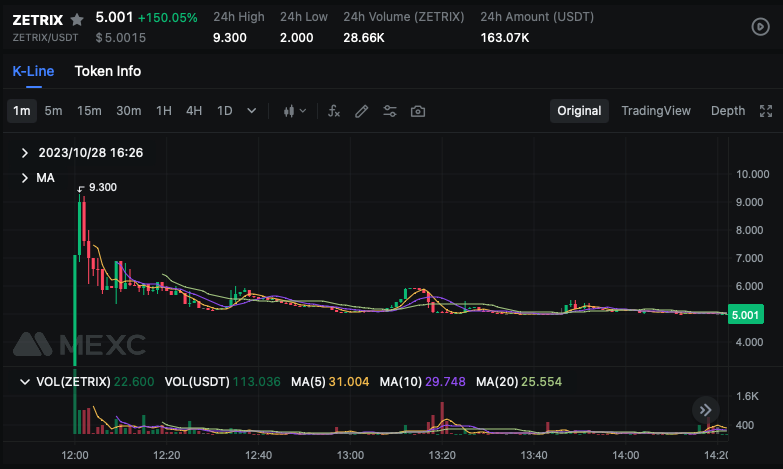Malaysia Minute: Zetrix's IEO Success, ICP's $20M Grant, Ringgit Stablecoin Issuer BLOX Talks

All eyes were on MYEG-owned Zetrix this week as crypto punters witnessed the successful completion of the ZETRIX IEO campaign on the Coinstore exchange. The Initial Exchange Offering (IEO) saw Zetrix blockchain releasing 1 million ZETRIX tokens at a starting sale of US$5 per token.
Its 5-day IEO campaign completed its goal of raising $5 million USDT with a 14% oversubscription, achieved on the fourth day. Subsequently, the publicly owned blockchain infrastructure launched a secondary token sale of 200,000 ZETRIX tokens for an additional $1 million USDT after the success of its primary campaign. This brings the total IEO raise to over US$6.8 million in USDT tokens, spread across 1.2 million ZETRIX tokens.


Following the success of the campaign, the token proceeded with its multi-exchange launch strategy the next day, first trading on the MEXC exchange, where it pumped to $9.30 from its listing price of $2 in its first minute. The token, however, was unable to sustain its pump and succumbed to the market's downward pressure for the remainder of its debut.

The token was eventually launched on the other two exchanges, launching first on BitForex and subsequently Coinstore, within one hour of each other. At the time of writing, the token is currently trading at $5.001 per ZETRIX on MEXC.
Synergy Lab's Dedicates an ICP HUB in Malaysia: Serious Business With a $20M Grant Program
In a media event, Synergy Labs launched a dedicated office in Kuala Lumpur, becoming Malaysia’s official Internet Computer Protocol (ICP) center to support the growth and development of blockchain and AI technology startups in Malaysia.
The Malaysian ICP Center comes from the fruition of an earlier announcement from DFINITY's ICP ASIA Alliance earlier in September, where its goal remains to supercharge Web3 adoption into Asia through a $20 million grant program.
During the event, the head of Synergy Labs Malaysia, Shas Fung, said that the mission is clear, to facilitate Malaysian developers to build solid blockchain projects on the ICP blockchain and to drive Web3 adoption.
“Our support goes beyond financial assistance, and we plan to grow the community by hosting learning camps, hackathons, and more. We want to build an ecosystem of builders in Malaysia, which goes beyond funding schemes but also includes sharing knowledge, building relationships, and providing necessary support to aspiring new builders.”
Synergy Labs Malaysia intends to achieve this through its two types of grants, funding for community building and funding for dapp development.
Community building grants of US$5,000, US$15,000, and US$25,000 are available to support events, ideation contests, hackathons, and content creation.
On the other hand, developer grants of US$5,000, US$25,000, and US$100,000 are ready to catalyze the growth of the ICP ecosystem to make the blockchain more accessible to new developers.
BLOX, Malaysia's Newest Ringgit Stablecoin Issuer
I encountered BLOX earlier in September through a message on WhatsApp where there was industry chatter about Malaysia's latest Ringgit stablecoin issuer hosting its MYRC on the Coinstore exchange.
Avoiding the presumption of possible macro, micro, and legitimacy challenges a Ringgit stablecoin could impose, I sought out BLOX CEO Ethan Chung to find out his motivations towards embarking on an uphill battle to claim legitimacy within the nascent blockchain market, the scrutiny surrounding a Ringgit Stablecoin (MYRC) and product-market fit.
He initiates the conversation with a statement that the MYRC is fully backed by an equivalent amount of ringgit-denominated assets, hosted on a Uniswap LP.
He continues with a picture-perfect reality of sustainable use cases and imagination for a MYRC-enabled future. Stablecoins would enable better protection for supply chain businesses he says.
"As of right now, the Malaysian supply chain industry faces a myriad number of challenges, including having to prove themselves against human rights accusations from such as underpaid labor." He explains that this creates a hurdle for export-based enterprises who engage in legitimate practices and that the use of a stablecoin payout to laborers would probably show international watchdogs that workers are paid with dignity.
The deeper I pried, I found out that the startup assumed a bottom-up strategy for its initial proof-of-concept, an interesting choice for stablecoin issuers given that most around the region would opt for the path of developing wholesale CBDCs instead.
Chung says that the motivation behind the choice of POC would be the one of less resistance, and that was to team up with existing enterprises to solve their problems first. Hence, BLOX's value-add approach by working together with Malaysian-based enterprise blockchain solution provider SiniSana.
Chung would later add that his decision to drive the POC was also a forced conclusion after facing a myriad number of chicken-and-egg challenges on his path to legitimacy.
He further added that the lack of regulation on his side makes it tougher to find clients who would opt for a "safer" approach than his blockchain use case.
According to him, Bank Negara Malaysia has been supportive of the novel idea of the development of the MYRC, and they told him that they would consider his company for the BNM sandbox only after BLOX "found a reasonable use case for the MYRC."
Needless to say, the BNM sandbox would aid his journey in securing more clients and more importantly, a notable role in legitimacy.
But beyond legitimacy, he faces another challenge in convincing his potential clients to work with him - crypto onboarding.
However, he remains undeterred as their next move for legitimacy would come in the form of working together with the existing regulated RMO players. In priority, are the digital asset custodians and eventually the local exchanges.
